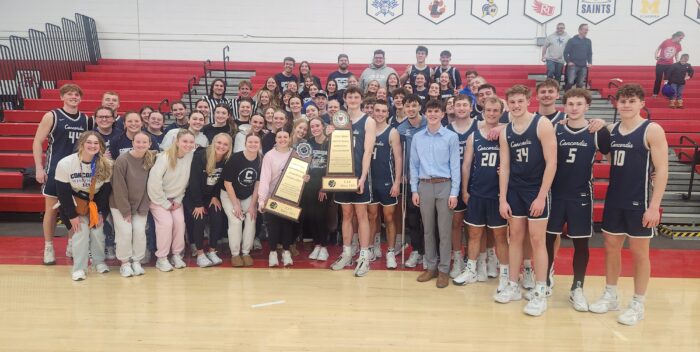The future of CIT is in the works
The Bulldog men’s and women’s basketball teams won the Concordia Invitational Tournament at Concordia Ann Arbor in January. The teams, coaches, pep band members and fans pose for a picture with the CIT trophies.
Photo credit: Concordia Athletics
By Cohen Carpenter
This article is featured in the March print edition of the Sower newspaper.
A pledge of support by Concordia University, Nebraska, and Concordia University Chicago may help ensure the Concordia Invitational Tournament, which has woven basketball rivalries into the fabric of Lutheran higher education for 72 years, continues past this year even as Concordia University Ann Arbor plans its exodus from the storied competition.
CUNE and CUC renewed their support for CIT in February after CUAA decided to withdraw from the competition due to financial issues. Over the past few years, the school laid out plans to reduce academic offerings and eliminate athletic programs after this school year to address the problems.
“We wish this dramatic action wasn’t necessary,” said CUAA President Erik Ankerberg in a campus-wide email sent in February 2024, “but to secure our future together as an institution, it is.”
For CUNE President Bernard Bull and CUC President Russell Dawn, however, the tournament’s value transcends the balance sheets. They’re eyeing a 2026-27 revival after a one-year hiatus to “prepare for the future of CIT,” according to Bull.
“It was something that President Dawn and I both shared as the desired path forward, even soon after Concordia University Wisconsin/Ann Arbor announced plans not to participate,” said Bull. “During this most recent CIT, President Dawn and I met and affirmed our shared and continued interest in continuing this inspiring legacy. So, there really was no convincing needed on either side.”
Bull had helped CUW and CUAA merge in 2014, so for him, the CUAA decision is personal.
“My heart breaks for those suffering and grieving the changes and challenges at CUAA,” he said.
A Lutheran education veteran, he’s coached alongside Wisconsin’s basketball coach, taught with Ann Arbor’s athletic director, and mentored Chicago colleagues.
“It is, in a way, like a family reunion for me,” he said. Like many family reunions, CIT’s most recent rendition in Ann Arbor stirred mixed emotions for all involved.
“Given the complexities related to the future of CUAA, there was certainly another layer of emotion and intensity at times,” Bull said. “Even amid these difficulties, I also experience a great deal of joy and gratitude.”
Founded in 1951 by Concordia Seminary’s Eldon “Pete” Pederson, CIT has grown from a four-team basketball clash to include women’s games, cheer and dance, uniting Concordians across decades. Nebraska and Chicago see it as a lifeline to that heritage.
“It signifies iron sharpening iron, shared mission and ministry in Lutheran education, sticking together through times of joy and challenge, and a common bond,” said Bull. “CIT is more than an athletic competition. It is a time for us to gather, compete, worship together, socialize, be reminded of our shared mission in Lutheran education and so much more.”
Dawn last month, in a statement on the Chicago university’s website, called the tournament “a perennial favorite for players and fans alike” and “great for students, and therefore great for our universities.”
Graduate senior point guard Kendal Brigham said the CIT is more than a game, representing a celebration of shared faith and community.
“This year, you could feel the tension,” Brigham said of the most recent tournament, hosted in Ann Arbor. “Concordia Ann Arbor sadly has to shut down, and there was this lingering feeling of sadness, maybe a bit of anger.”
A five-year veteran of CUNE’s women’s team and a first-time starter this season, Brigham noted the electric atmosphere despite the undercurrent of loss.
“The crowd was awesome — so many people travel and really get into the games,” she said. “It’s why CIT is so fun.”
The new vision for the tournament includes rotating host sites — Chicago, Seward, perhaps a third alumni-rich locale — to keep the flame alive. A one-year hiatus allows for time to form a plan of action. Past CITs have welcomed other schools, such as Westmar College and Concordia Theological Seminary, Fort Wayne in Indiana, suggesting flexibility.
“I’ve heard all sorts of suggestions from many people, especially alumni,” said Bull. “We’ve not taken anything off the table yet. We really want to spend this year working together to figure out the best and most promising options.”
Possible candidates for inclusion could include Concordia University Irvine, which now competes in the Pacific West Conference in National Collegiate Athletic Association Division II. Even in the most recent CIT, National Association of Intercollegiate Athletics schools such as CUNE were competing with NCAA schools such as Concordia Wisconsin.
The Lutheran Church-Missouri Synod has not taken an official stance on CIT, be it about the addition of future teams or the continuation of the tournament in general.
“In informal conversations with several leaders in the LCMS, I’ve received nothing but encouragement in the shared decision by CUC and CUNE to seek a path forward for CIT,” Bull said.
Brigham dreams of a future where every Concordia student experiences a home CIT.
“It’s a blast for everyone on campus,” she said. “I’d love to bring my kids someday, reconnect with teammates and coaches. If CIT continues, it’ll keep bringing Concordians together — that’s what it’s all about.”
Bull said informal talks with church leaders have been encouraging. For now, the one-year pause offers breathing room to plot the path ahead.
As Brigham sees it, the stakes are simple: “My wish is that CIT can continue. But if it doesn’t, I’m just happy both trophies stay where they belong — at Concordia Nebraska.”



















